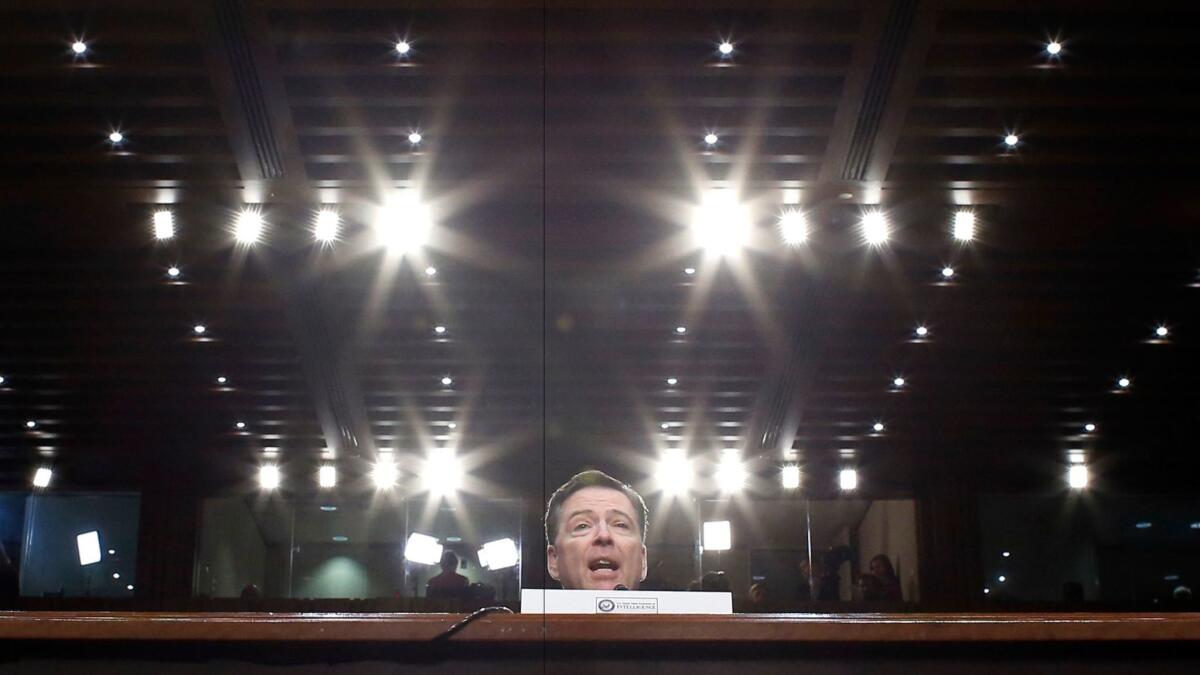Op-Ed: Trump was ham-fisted with Comey. But is that criminal?

- Share via
“We won!” President Trump’s lawyer Marc Kasowitz reportedly enthused after former FBI director James Comey released his opening statement in advance of Thursday’s televised Senate hearing. “Comey delivers dramatic rebuke of Trump,” read the post-testimony headline in The Hill.
What if both sides are right?
Comey did confirm that the president was not under investigation, and that there’s no known evidence of Russia tampering with votes in last November’s election. At the same time, the nation’s former top cop painted a damning portrait of an erratic, lying president whose ham-fisted interactions skirted up to the edge of obstruction of justice.
Whether the latter charge rises to the level of criminality will be a question for special prosecutor Robert Mueller. As Comey himself pointed out back when he declined to prosecute Hillary Clinton over her use of a personal email server, criminal intent matters.
But in the meantime, and in the absence of potentially damning information about, say, Trump’s financial relationships with Russian entities, we may be blundering into a kind of worst-case scenario. What if under all that smoke there’s just smoke? What if the president’s misbehavior is due to incompetence and boorishness, not corruption and collusion? Are we really prepared to impeach a guy over a tweet?
Being ignorant and/or contemptuous of the mores and rituals of the political class was arguably Trump’s biggest selling point as a candidate.
Democrats call foul — and with justification — when Republicans like House Speaker Paul Ryan shrug and say Trump is “just new to this” governing stuff.
Still, Ryan’s not wrong. Being ignorant and/or contemptuous of the mores and rituals of the political class was arguably Trump’s biggest selling point as a candidate during 2016’s virulently anti-establishment election. Anxiety-stricken commentators treated each new violation of norms — from the Mexican rapists to the “Access Hollywood” tape to the Muslim ban — as either a campaign-killer, or proof that the country has fallen into moral decay. Trump voters, meantime, viewed the news media’s hyperventilation as validation that their candidate was not one of them.
This is not presented here as an excuse for Trump, but rather as a practical political problem for America. We know, definitively, that Donald Trump will lie, contradict himself, and step all over the conventions of presidential behavior. We also know that’s what a significant percentage of voters liked, and still like, about the guy.
This administration is almost excruciatingly inexperienced, in part because there isn’t a deep bench of political talent who believe in the rough tenets of Trumpism: skepticism of multilateral institutions, mercantilist ideas on trade, belligerence toward radical Islam, suspicion of immigrants. Plenty of administration officials share the president’s inability to color inside the lines.
What else do we know? That with the exception of Republican office-holders, who are reluctant to cross swords with the guy, much of official, institutional Washington despises Donald Trump.
The press hates him: Only 20 newspapers nationwide endorsed him for president, compared with more than 240 for Hillary Clinton, and that was before “Fake News” became a hashtag. The intelligence community is no great fan, what with his comparing the CIA to Nazis and all. Wherever you see the establishment in Washington — the Brookings Institute, the Washington Post editorial page, even the organs of establishment conservatism — you see the strongest condemnations of Trump.
Can all these facets of the establishment collude to help derail this presidency? If so, there well better be fire underneath that smoke. Having Michael Flynn call the Russians during a transition to talk about sanctions, and then lie about it, is bad behavior, but only that. Having multiple inappropriate and highly suggestive conversations with the FBI director is a serious breach of conduct, but not Nixonian.
The institutions that Trump disdains are now watching his every move. He will lash back, fire people, write dumb tweets, attempt to influence things he should not. But if that is all he does, and there no secret corruption or financial ties exist underneath all that squirrelly behavior by administration incompetents, then seizing on those mistakes to prematurely end even the most distasteful of presidencies would come with real danger.
The country is in a kind of emotional state of hyper division that most Americans have never experienced. If people vote for a president to confront the establishment they despise, and then that establishment forces him out on ticky-tack fouls, we may look back on 2016 as a high-water mark in comity.
Matt Welch is editor at large of Reason, a magazine published by the libertarian Reason Foundation, and a contributing writer to Opinion.
Follow the Opinion section on Twitter @latimesopinion or Facebook
More to Read
A cure for the common opinion
Get thought-provoking perspectives with our weekly newsletter.
You may occasionally receive promotional content from the Los Angeles Times.






